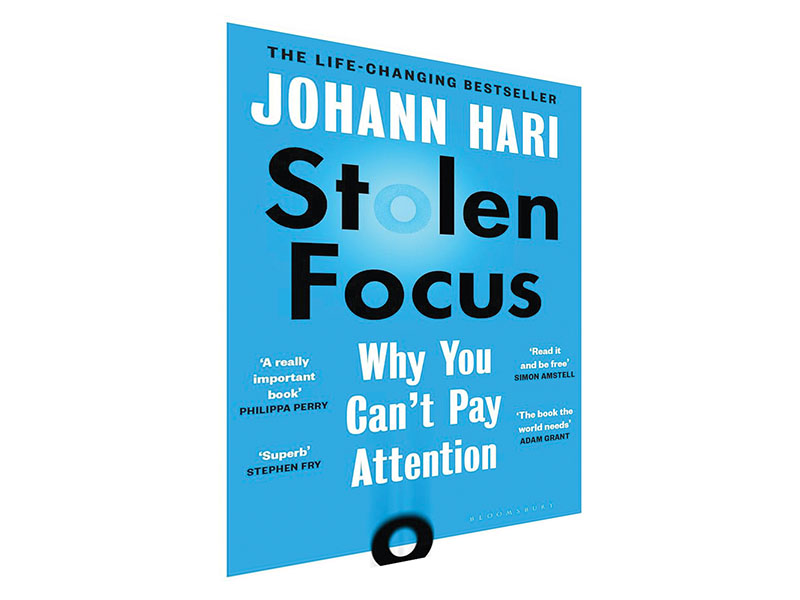Timely warning
 Stolen focus: why you can’t pay attention
Stolen focus: why you can’t pay attention
Johann Hari
Bloomsbury publishing
Rs.599 Pages 240
In this timely oeuvre the author alerts the world that latter-day tech maladies are stealing the minds, attention and focus of people worldwide, especially Gen Z
In this timely oeuvre, Johann Hari, an acclaimed author whose books Chasing the Scream (2015), Lost Connections (2018) have been published in 40 languages, and adapted for movies and television serials and whose TED talks have attracted over 80 million viewers, warns about a new epidemic sweeping the world — the erosion of concentration and dilution of cognitive capabilities.
In this tome of over 300 densely packed pages, the author lists the causes and effects of latter-day tech maladies that are stealing the minds, attention and focus of people — especially GenZ — worldwide. Among them: increase of speed, switching and filtering on digital media; collapse of sustained reading; mind-wandering; rise of tracking and manipulative technologies; surge in stress levels worldwide; deteriorating diets and rising pollution; rise of global ADHD (attention deficit hyperactivity disorder); and the trend of confining children physically and psychologically from youngest age.
To alert the world that a massive pandemic of stolen focus is likely to lead to cognitive decline of global scale, the author has taken great pains. This book is replete with dozens of interviews with technology leaders and savants, academics, psychologists, neurologists, scientists, researchers and authorities on behaviourial and social sciences. It is truly a labour of love.
From these interviews and investigations, the author concludes that the modus operandi of tech giants of Silicon Valley and Palo Alto — Google, Meta, Twitter, Instagram — is to continue innovating and developing algorithms that keep users hooked to an ever-growing number of attention-grabbing scrollers and browsers. For them, “when the consumer sleeps, business sleeps,” notes Hari.
As a result sleep deprivation and its natural consequence, slowing minds and mental agility has become ubiquitous. According to Hari, 40 percent of Americans, 23 percent Brits, and overall, 15 percent of the Western world are sleep deprived. The average American spends 17 minutes on reading, 5.30 hours daily on his cellphone, and 20 percent of road accidents are due to digital distraction. The average American teen believes he can follow six to seven forms of media at the same time. Information overload is increasing the pace of life and burdening people of all ages — especially youth — with a growing stress mountain.
The importance of sleep adequacy is highlighted in a full chapter. Hari writes that the modern world is living to the rhythm of machines. During a three-month experiment when he disconnected with internet and all digital devices, he learned to live by the rhythm of the sun. By inventing artificial lighting, man has extended daylight resulting in lesser hours of sleep, and the healing and recuperative benefits of sleep have been canceled by stress-related ailments — diabetes, depression and premature fatality. Children are being confined to home and hearth because of “fear psychosis” and often become hyperactive.
“When attention spans break down, problem solving breaks down. We resort to quick solutions. We lose the ability to have fully functional societies,” he writes. This dire situation is commonly exploited by vested interests. Hari cites examples of politicians blatantly using digital platforms to influence Brexit, election outcomes (Trump and Bolsonaro), and fake news to incite wars between nations.
In this well-timed book, Hari provides irrefutable evidence and corroborative data that an impending disaster is imminent. Big tech is using digital media to churn out algorithms and gadgets that prompt consumer addiction to keep cash registers ringing. The battle is for the eyeballs, minds and attention of consumers.
Fortunately Stolen Focus goes beyond cataloging the ruinous consequences of the new digitalised world. The author also presents solutions for combating this threat. He suggests collaborative campaigns combining individuals, family, neighbourhood, society, and government regulation. Societies, individuals and governments would do well to study, if not adopt, these suggestions for the greater good.
Unfortunately the focus of this volume is the Western world. There is little in this book about the impact of the digital tidal wave upon other countries and societies. Perhaps due to a paucity of data. But Stolen Focus leaves little to the imagination about the catastrophic impact it can have on two-thirds of the world population where mobile phones have become ubiquitous, unemployment is rampant, illiteracy high, and poverty endemic.
For every man, woman and youth drawn by the allure of digital devices, this book is essential reading. Education institutions worldwide should include it in their curriculum. For it is the young mind of today that will shape the future of tomorrow.
Johann Hari calls on the world to face the challenge by quoting prescient American writer James Baldwin (1924-1987). “Not everything that is faced can be changed, but nothing can be changed until it is faced.”
Anil Thakore
















Add comment